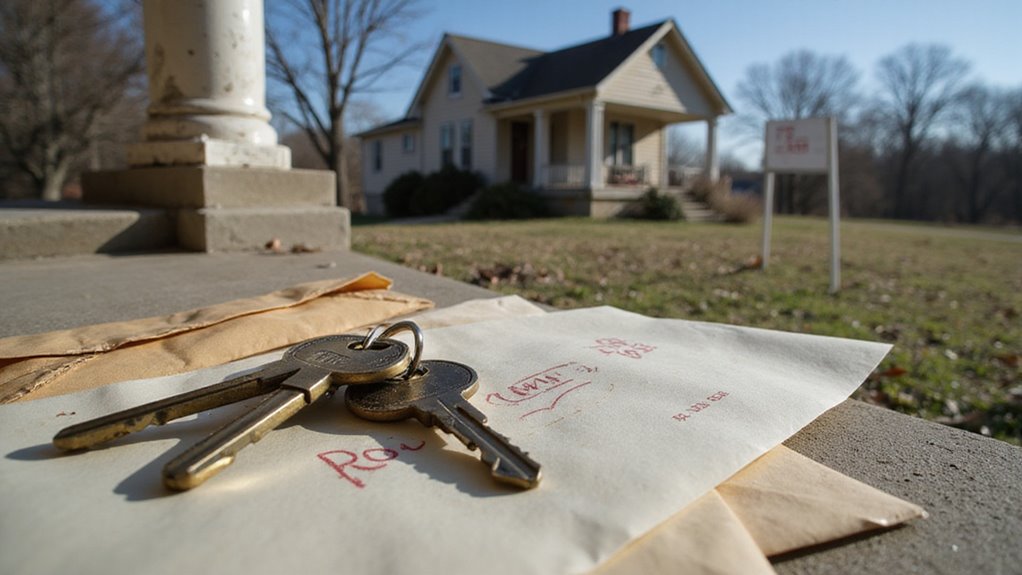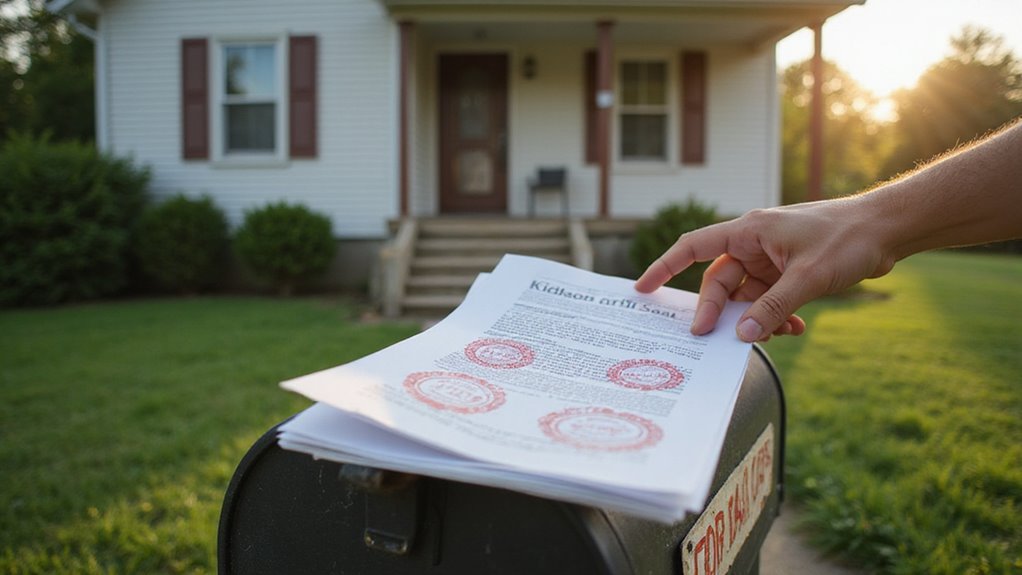If you want to sell a house in Kentucky, you might worry about existing liens. Liens can come from unpaid taxes, court judgments, or contractor bills. They attach to your property and make selling more complicated.
Liens create serious problems for homeowners. Buyers and lenders may refuse to move forward if there are unresolved claims. This can delay your sale or even stop it completely.
Yes, you can sell a house with liens in Kentucky, but you must deal with them first. You have to pay off or settle the liens to clear your title. This allows the sale to go through without issues for you or the buyer. This blog will explain the steps to handle liens and sell your house in Kentucky smoothly.
Key Takeaways
- Yes, you can sell a house with liens in Kentucky, but all liens must be resolved before transferring a clear title to the buyer.
- Liens are discovered during the title search process and must be disclosed to buyers under Kentucky law.
- Sale proceeds are typically used at closing to pay off liens, with the closing agent ensuring all debts are settled.
- Unresolved liens can delay, complicate, or even prevent the sale until they are cleared or negotiated.
- Selling to investors is possible with liens, but the sale price may be reduced by the lien amounts.
Understanding What a Lien Is

A lien is a legal claim against your house. It gives someone else rights to your property until you pay off a debt. Liens are important when selling your house in Kentucky. Before a sale can close, it’s essential for the property to have a clear title to ensure there are no legal claims that could impede the transaction.
If you owe money, a lien might be placed on your home. This can happen for unpaid property taxes or court judgments. A buyer cannot get clear ownership until you resolve these liens.
Buyers and lenders in Kentucky want a home without liens. If liens exist, your sale could be delayed or canceled. Handling liens before selling helps protect your interests and makes the process smoother. Some buyers may also be looking for homes with assumable mortgage features, which require the title to be clear of liens before the mortgage can be transferred.
Common Types of Liens on Kentucky Properties
There are several common types of liens on Kentucky properties. Mortgage liens are most common and secure the lender’s interest until your loan is paid. Tax liens happen if you owe property taxes. Common Kentucky property liens include mortgage liens from lenders and tax liens if you owe property taxes.
Judgment liens result from court decisions when debts go unpaid. Mechanic’s liens are filed by contractors if they are not paid for work or materials. Homeowners’ association liens can occur if you do not pay association fees. If you are preparing to sell a home with liens, you might need to consider renovations and repairs that may arise from deferred maintenance associated with the lien-related financial strain.
If any of these liens exist, they may appear during a property appraisal. Liens can affect your home’s value or make it harder to sell. Title insurance can protect buyers and lenders from unexpected liens.
If you want to sell your home, you should find and resolve liens before closing. This helps avoid delays or problems in the sale process. Always check for liens to protect your interests. It’s also important to review a title report to identify any existing liens or claims before proceeding with the sale.
How Liens Are Placed on a House

Liens are placed on a house in Kentucky when you owe money and do not pay. Creditors or government agencies use liens to try to collect what you owe. This can make it harder to sell your home or get a clear title. Sometimes, damaged or malfunctioning windows may also affect buyer interest and selling price, especially if buyers prioritize energy efficiency.
A lien is recorded with the county clerk. Creditors file a lien if you do not pay a debt. The lien gives them a legal right to your property.
If you lose a lawsuit, the person who wins can put a lien on your house. Some liens happen automatically, like when you miss property tax payments. These are called statutory liens and do not need a court action.
If you pay the debt, the creditor should remove the lien. If not, the lien can stay until the debt is paid or the house is sold. Always check for liens before selling or buying a home.
In addition to liens, health and safety concerns such as mold issues can also impact your ability to sell your house in Kentucky.
Why Liens Can Complicate the Selling Process
A lien can make selling your home harder because it creates a legal claim against your property. Buyers and lenders see this as a warning that someone else has a right to your home’s value. If you want to sell, you must resolve the lien first.
A lien makes buyers worry they may not get a clear title. Lenders may refuse to finance the purchase if a lien is present. This can delay or even stop the sale. Title searches in Kentucky will reveal different types of liens, which must all be cleared before the transaction can move forward.
Liens can come from unpaid contractors or home improvement bills. These legal claims stay with the property until they are paid off. If you have a lien, selling your house in Kentucky will be challenging unless you clear it. Sellers who attempt to handle the process themselves should be aware of the transaction complexity that comes with liens and FSBO sales, as these can involve intricate financial and legal steps.
How to Find Out If Your Kentucky Home Has a Lien

To find out if your Kentucky home has a lien, start by checking official records. Liens are legal claims on your property because of unpaid debts. If there is a lien, it can affect your ability to sell the home.
A title search is the most reliable way to reveal any liens. You can hire a Kentucky title company or a real estate attorney to do this. If you need proof, they will provide a report showing any liens on your property. It can also be helpful to start early with this process, as resolving liens may take time and could impact your selling timeline.
You can also visit the county clerk’s office where your property is located. County records are public and list any liens filed against your home. If you search by the property address or your name, you can find this information.
It is wise to check your mortgage and tax statements for any warnings about unpaid amounts. These documents might include notices if you owe money that could result in a lien. If you find anything unusual, contact the listed agency for more details.
If you confirm there are no liens, you can move forward with selling or refinancing your home. If you do find a lien, you must resolve it before completing a sale. Knowing your lien status helps prevent surprises during real estate transactions. Make sure you gather required paperwork early in the process to avoid delays or legal issues when selling your house.
The Role of Title Searches in Property Sales
A title search checks a property’s legal history before selling in Kentucky. This step protects both the seller and the buyer. It helps find any legal issues that could affect the sale. Public records are reviewed for liens, judgments, or claims on the property. If any liens are found, the seller must resolve them before closing. Title searches help avoid unexpected problems like unpaid taxes or contractor claims.
Taking care of these legal checks early is similar to making the necessary repairs before listing a home, as it helps build trust and ensures a smoother process for everyone involved. Resolving these issues early prevents lawsuits or sale delays. Sellers must request a full title search to meet legal duties. This process ensures a smooth and safe property transfer. If you are facing foreclosure or liens, working with a cash home buyer can help you resolve these problems quickly and move forward with your sale.
Disclosure Requirements for Sellers in Kentucky

Kentucky law requires home sellers to reveal important details about the property. Sellers must complete a written disclosure form before selling. This form helps buyers understand the property’s true condition and any legal issues. If you need to sell quickly or don’t want to make repairs, some cash home buyers provide a fast and hassle-free option.
If a title search finds liens or claims, you must disclose them. The law also requires you to share any known structural problems. Legal disputes involving the property must be listed as well.
You need to disclose: You need to disclose any unpaid liens, structural defects, or ongoing legal issues that could impact the property’s value or use.
- Any unpaid liens or court judgments on the property.
- Significant defects in the home’s structure or systems.
- Any lawsuits or legal issues that could affect the property’s value or use.
Failure to follow these rules could lead to legal trouble or the sale being canceled. Accurate and honest disclosure protects both you and the buyer. If you’re concerned about selling a house with liens, some companies in Simpsonville will buy your property regardless of the situation.
Options for Dealing With Liens Before Selling
You must clear all liens before selling your property in Kentucky. Liens can prevent you from transferring a clear title. If you do not resolve them, the sale cannot move forward.
A title search will show all existing liens on your property. This search may include property tax, homeowner association, or judgment liens. If you have any liens, you must pay them off or settle them.
Once you pay the debt, ask for a release or satisfaction letter from the creditor. You need to file this document with the county clerk. If you skip this step, the lien may still appear on your title.
Addressing liens early can help avoid delays at closing. If you negotiate a payment plan, get the agreement in writing. Proper documentation ensures your title is clear for the buyer.
Some sellers facing liens may consider selling as-is to real estate investors, which can speed up the process if they are unable or unwilling to make repairs before closing.
Selling With Liens: As-Is Sales and Investor Buyers

Selling a house with liens in Kentucky is possible if you sell as-is to an investor. Investor buyers often purchase homes with liens and handle the process. You may not get full market value, but this can make selling easier.
Investors will subtract the lien amount from their offer. You should expect a lower sale price in these cases. If you need a fast sale, this is a practical option.
It helps to market your home to cash buyers or companies who buy distressed properties. These buyers are used to complex title issues. They can move quickly once they agree on a price.
Kentucky law requires you to tell buyers about any liens on your property. Full disclosure is necessary to avoid legal issues. If you are unsure, consult a real estate professional for guidance.
Paying Off Liens at Closing
At closing, you’ll need to satisfy any outstanding liens using the sale proceeds, a process your closing agent will coordinate by obtaining payoff statements and ensuring proper disbursement. The closing agent’s role is critical—they verify lien amounts, collect payments, and confirm release of the liens. Keep in mind, lien payments reduce your net proceeds, so you should review payoff figures in advance to avoid surprises.
Lien Payoff Process
The lien payoff process ensures all liens on your Kentucky property are paid before closing. You cannot transfer a clear title if liens remain unpaid. All liens must be resolved so the buyer receives a property without any claims.
Sellers must first get official payoff statements from each lienholder, including tax authorities and lenders. These statements show the exact amount needed to clear the debt. If you miss this step, the title will not be clear.
Sale proceeds are used to pay off liens during closing. The settlement agent deducts the lien amounts before you get your share. This process protects both the seller and the buyer.
Each lienholder must provide a release or satisfaction of lien after payment. If releases are not obtained, the liens stay on the property. Always confirm that the title is free of liens before the sale is final.
Role of Closing Agent
The closing agent makes sure all property liens are paid before your Kentucky home sale can finish. This person is usually a title company or real estate lawyer. Their main job is to protect both the buyer and seller during the closing.
A closing agent checks for liens by doing a title search. Liens can come from unpaid taxes, home repairs, or other debts. If any liens are found, the agent contacts the lienholders for exact payoff amounts.
The agent pays the liens from the money made in the sale. This step is important because unpaid liens can stop the sale. If all liens are paid, you can transfer the property without legal issues.
If the property is valued correctly, there should be enough money to pay all debts. The closing agent’s careful work allows a smooth transfer to the new owner. Without this process, the sale might not go through.
Impacts on Sale Proceeds
Liens reduce the amount of money you get from selling your home. The closing agent pays off liens first using your sale proceeds. You receive only what is left after these debts are paid.
If your home’s value is close to what you owe, you may get little or no money. Accurate property valuation helps you avoid surprises at closing. If there is not enough equity, you might need to pay extra at closing.
Home staging can help raise your home’s sale price. However, liens always get paid before you receive any money. If you want to maximize your payout, consider all these factors when preparing to sell.
Negotiating With Lien Holders
Having a lien on your property can make selling more difficult. You can often solve this by talking directly with lien holders. Explain your plan to sell the property.
Lien holders might accept less than the full amount owed if the sale price is too low. Show proof of your home’s value, such as inspection reports or photos of staging. This helps prove you are acting in good faith.
If you cannot pay the full debt at closing, try to set up a payment plan or settlement. Always get any agreement in writing. Kentucky law requires written consent for any lien changes before closing.
Legal Implications of Selling a Home With Liens
When you sell a house with liens in Kentucky, you must comply with strict disclosure requirements to avoid legal liability. Failing to inform buyers about existing liens can jeopardize the sale and expose you to potential lawsuits. Liens also cloud the property title, making it impossible to transfer clear ownership until they’re resolved.
Disclosure Requirements for Sellers
Kentucky law requires home sellers to give buyers accurate information about the property. This is important if there are any liens attached. Undisclosed liens can affect taxes and the value of the home.
If you sell a house in Kentucky, you must tell buyers about any existing liens before closing. The law makes this a requirement, not just a suggestion. Failing to do so could lead to lawsuits and financial penalties.
Full disclosure helps buyers understand the real costs and risks before buying. Accurate information can prevent legal disputes later. Kentucky statutes make it clear that sellers must be honest about any liens or other claims on the property.
Impact on Property Title
Liens on a Kentucky property make the title unclear. You cannot give a clear title to a buyer until all liens are paid. A title with liens is not considered clean.
Title companies will find liens during closing. Most lenders will not approve a mortgage if liens exist. Buyers usually want a clear title before buying.
Liens can lower your property’s value. If buyers see risk, they may offer less or lose interest. In a slow market, liens might make it harder to sell your property.
Working With Real Estate Professionals and Attorneys
Selling a home with existing liens in Kentucky requires help from real estate agents and attorneys. These professionals understand property laws and handle the details of the sale. If you work with them, you can avoid legal mistakes and delays.
A real estate agent can figure out your home’s value even if there are liens. Agents study the local market to set a competitive price. They can also suggest ways to attract buyers despite the liens.
An attorney will check all legal documents related to the liens. If you have questions about lien removal or creditor negotiations, the attorney will guide you. Legal help ensures you follow Kentucky laws and protect your interests during the sale.
Steps to Prevent Liens From Affecting Future Sales
To protect your future sales, you’ll need to conduct regular title searches and address any debts before they become liens. Staying proactive with debt resolution helps you identify and clear possible issues before they cloud your property’s title. By following these steps, you maintain a clean record and ensure a smoother transaction when you’re ready to sell.
Regular Title Searches
You can prevent liens from harming your home sale in Kentucky by doing regular title searches. These searches show any existing liens on your property. If you find a lien early, you can fix the problem before selling.
Kentucky law pays older liens first during a sale. This may affect how much money you get from the sale. If you know the lien order, you can plan better.
Annual title searches help you catch any new liens. Title insurance can protect you if a lien goes unnoticed. If you keep your insurance active, you stay protected from hidden problems.
Proactive Debt Resolution
Proactive Debt Resolution means taking steps to handle debts before they cause problems for your property. If you resolve debts early, you lower the risk of liens affecting a home sale in Kentucky. This approach keeps your property title clear and makes selling easier.
Homeowners should check for unpaid taxes, contractor bills, or child support regularly. Outstanding debts can lead to liens if not addressed in time. You should pay these debts as soon as possible to avoid complications.
An accurate property valuation helps you understand your available equity. If you know your equity, you can plan to pay debts during a sale. Homeowners may consider mortgage refinancing if they expect financial trouble.
Good record-keeping helps track all payments and debts. Early attention to liabilities protects your property’s title. These steps help prevent legal issues and give you peace of mind.
Conclusion
If you need to sell a house with liens in Kentucky, you must address the liens before closing. If you do not resolve them, you may face delays or cancellations. If you work with professionals, you can often find solutions that help the sale move forward.
If you want to avoid complications, you should consider all your options for selling. If you choose a cash buyer, you can often sell faster and with less hassle. If you need a quick and simple process, this may be your best choice.
At OC Real Estate, we buy houses for cash in Kentucky, even if there are liens. If you want to sell without stress or uncertainty, we can help. Contact us today to see how we can make your sale easy and efficient.

